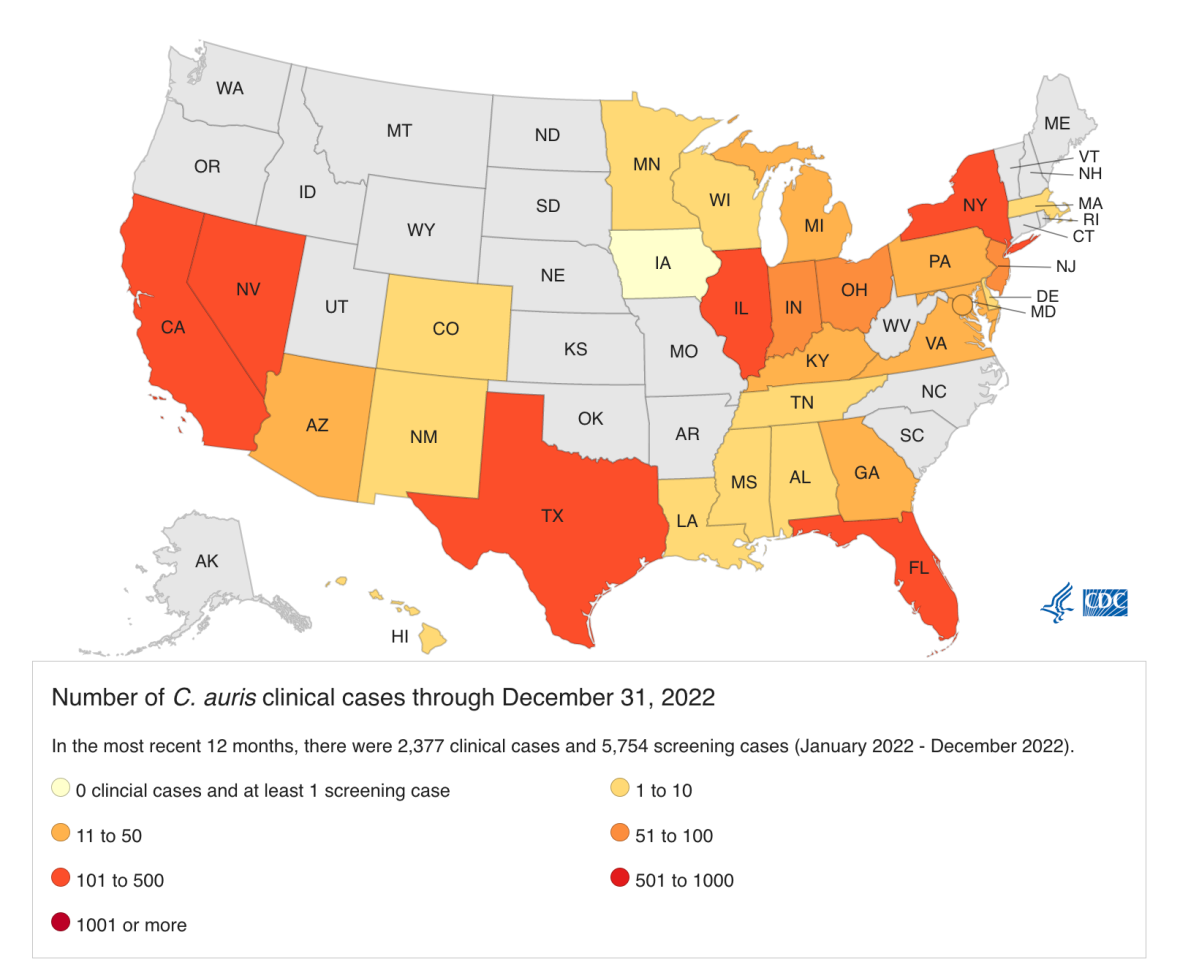Cases of a drug-resistant infection caused by the fungus Candida auris are on the rise in the United States, according to new data from the Centers for Disease Control and Prevention (CDC). The fungal infection has proved deadly, especially for those with compromised immune systems, and has demonstrated an ability to spread easily in health-care settings.

The CDC data was published Monday in the Annals of Internal Medicine, amid an outbreak of fungal infections in long-term care facilities in Mississippi. The U.S. health agency found that cases of C. auris increased 95 per cent from 2020 to 2021 following a 44 per cent increase the year prior.

Preliminary figures estimate that there were 2,377 active C. auris infections across the U.S. in 2022, with 5,754 “colonization” cases. A colonization case denotes when a person has evidence of the fungus in their body without signs of an active infection.
C. auris, a type of yeast that can infect the bloodstream, is resistant to multiple anti-fungal drugs and is estimated to kill about 40 per cent of people who become infected, according to Health Canada. Even when patients survive, they can remain “colonized” with the fungus for years after treatment, the CDC says, and potentially pass it along unsuspectingly.

Get weekly health news
These fungal infections are of most concern to people who have been hospitalized for long periods of time, are at high risk of infection, or have medical implants. The organism often causes no symptoms in healthy people.
C. auris was first detected in the U.S. in 2016, though case numbers remained low until the “dramatic increase in 2021,” the CDC report reads. The fungus was first discovered in 2009 in Japan and has since caused outbreaks in numerous countries around the world.
Health Canada told Global News that there have been 43 known cases of C. auris in Canada since 2012, up from 31 since the last figures were updated in 2021.
“This includes both infected and colonized cases. Some of these cases were associated with travel and did not originate here,” a spokesperson said.
Health Canada says the fungus is “an emerging global health concern” that has the potential to spread in Canadian healthcare settings.
“Similar to the experience of other countries, it is possible that C. auris will become more common in Canada, including the potential for outbreaks in healthcare and long-term care facilities,” the statement reads. “Unlike most other fungi in the Candida family, C. auris can cause outbreaks in healthcare settings and can be multi-drug resistant.”
The agency notes that the “risk to the general population at this time is considered very low,” and, so far, all cases of C. auris infections in the country have been responsive to anti-fungal treatment.
Dr. Meghan Lyman, chief medical officer in the CDC’s Mycotic Diseases Branch and lead author of Monday’s study said that rise in C. auris infections, “especially in the most recent years, are really concerning to us.”
“There’s still a lot to learn about colonization patterns,” Lyman said. “While (medicine) may treat the infection, we don’t have evidence that it completely eliminates C. auris from their body.”
The CDC’s warnings come as Mississippi battles an outbreak of the fungus.
At least 12 people in the state have been infected with the fungus with four “potentially associated deaths,” said Tammy Yates, spokesperson for the Mississippi State Department of Health. Both those numbers doubled since an earlier update on the outbreak in January. The first cases were noticed in the state last year in November.
Transmission of the infections occurred in two long-term care homes, with Yates noting that “multi-drug resistant organisms such as C. auris have become more prevalent” in such facilities and among “highest risk individuals.”
The World Health Organization ranked C. auris as one of the worst fungal threats facing humanity today, given its high mortality rate and resistance to treatment. Recent research suggests that serious fungal infections as a whole affect 300 million people worldwide and more than 1.5 million die from them each year.
Dr. Waleed Javaid, director of infection prevention and control at Mount Sinai Downtown in New York, said that the new CDC data on C. auris is “worrisome.”
“But we don’t want people who watched The Last of Us to think we’re all going to die,” Javaid said. “This is an infection that occurs in extremely ill individuals who are usually sick with a lot of other issues.”
Global News has reached out to Health Canada for further comment on the current status of C. auris infections in the country.











Comments
Want to discuss? Please read our Commenting Policy first.